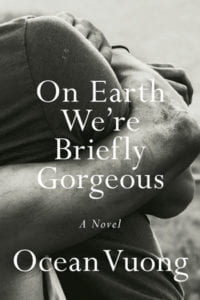“On Earth We’re Briefly Gorgeous” Reads Like A Daydream

By Minahil Salam
In 2014, Ocean Vuong’s poem, “On Earth We’re Briefly Gorgeous,” was published in Poetry Magazine. It is a multi-part poem that focuses on particular life events and the gripping emotion behind them. In June, the author’s breathtaking novel of the same name was published by Penguin Press. The whole novel is addressed to the main character Little Dog’s mother (who cannot read), which positions it as a one-sided letter. A confession, of sorts, without the “audience” ever being able to read it. It is raw, intense, and honest.
At a talk at NYU’s creative writing program this fall, Vuong considered the problematic nature of conversations about productivity. He spoke to the audience about how “we all have that friend [asking] I’m on my fourth novel how about you?” At age thirty-one, Vuong’s success with his debut novel already gives him a seat at the table. He seems to be suggesting, though, that the decision to be on his second book rather than his fourth, is a conscious one. Vuong discusses how the productivity conversation is so focused on being quantifiably “successful” that the other half of the equation–curiosity, and the value of following that curiosity to all ends––is lost. Perhaps Vuong’s slower approach contributes to the effect of his writing, which so thoroughly submerges the reader.
“On Earth We’re Briefly Gorgeous” reads like a long daydream. It evokes a feeling in your chest like a slow sinking boat. The romance between Little Dog and Trevor is heavy, painful, heartwarming, and tragic. The title appropriately conveys what Vuong’s language shows––that within our lives, however much hardship or sadness, there are moments that make one feel terribly alive. This is demonstrated not only through Little Dog’s romance, but also with his mother, Ma, and grandmother, Lan. Little Dog’s ability to empathize with his mother while addressing her harmful behavior towards him contributes to these moments of empathy that make your heart hurt.
“On Earth We’re Briefly Gorgeous” is like opening a desk drawer that is not your own and reading a letter that was not meant for you. At many times, it feels like a secret you’re honored to be in on. Little Dog’s lack of straightforward dialogue with anyone––but especially his mother––contributes to it. Vuong’s original poem contains one singular long paragraph––the rest is fragmented. From it, there are lines such as “I wanted to disappear—so I opened the door to a stranger’s car.” Vuong’s capacity to attach unlike fragments and jam them together, making them into a whole you never thought was possible, is striking. He does this again with “he was sobbing into his hands (hands that tasted like rust).” He mixes the philosophical and the physical in a way that gets to the center of the idea, in lines such as “don’t we touch each other just to prove we are still here?” and “I threw myself on the bed like a torch & watched the flames gnaw through my mother’s house.” Vuong’s language pulls to the center of your being and mixes all of your senses together. This can be through performing an action outwardly to close the door on an inner world. Emotion released to reveal a taste. Touch as a form of remembrance. What stillness really feels like. The weight of being a living thing––graspable, consumable. His poem proves to be a great frame for understanding his context for the novel itself, which is extremely poetic, with strong imagery and emotive language.
While novels in the past decade have attempted to come to grips with current issues, Vuong’s is not an “addressing a social issue” book. At no point does there seem to be a mission statement. The lack of distinctive “point,” in fact, is part of what makes it so refreshing. Instead, what lies within “On Earth We’re Briefly Gorgeous” is the thing we’ve all been missing––what does it really mean to be truly, rawly, human?
Minahil Salam is a senior at NYU studying English Literature & MCC (Media, Culture, and Communication).

